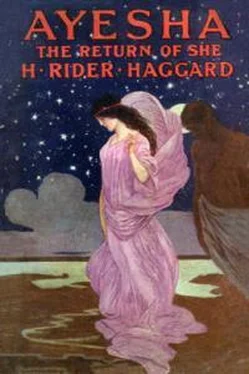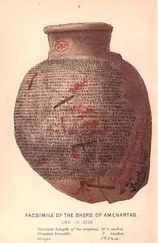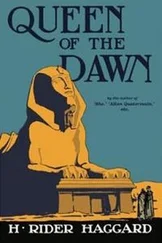More, thrice he had proved his unalterable fidelity to her. First, by his rejection of the royal and beautiful, if undisciplined, Atene. Secondly, by clinging to Ayesha when she seemed to be repulsive to every natural sense. Thirdly, after that homage scene in the Sanctuary—though with her unutterable perfections before his eyes this did not appear to be so wonderful—by steadfastness in the face of her terrible avowal, true or false, that she had won her gifts and him through some dim, unholy pact with the powers of evil, in the unknown fruits and consequences of which he must be involved as the price of her possession.
Yet Ayesha was miserable. Even in her lightest moods it was clear to me that those skeletons at the feast of which she had spoken were her continual companions. Indeed, when we were alone she would acknowledge it in dark hints and veiled allegories or allusions. Crushed though her rival the Khania Atene might be, also she was still jealous of her.
Perhaps "afraid" would be a better word, for some instinct seemed to warn Ayesha that soon or late her hour would come to Atene again, and that then it would be her own turn to drink of the bitter waters of despair.
What troubled her more a thousandfold, however, were her fears for Leo. As may well be understood, to stand in his intimate relationship to this half divine and marvellous being, and yet not to be allowed so much as to touch her lips, did not conduce to his physical or mental well–being, especially as he knew that the wall of separation must not be climbed for at least two years. Little wonder that Leo lost appetite, grew thin and pale, and could not sleep, or that he implored her continually to rescind her decree and marry him.
But on this point Ayesha was immovable. Instigated thereto by Leo, and I may add my own curiosity, when we were alone I questioned her again as to the reasons of this self–denying ordinance. All she would tell me, however, was that between them rose the barrier of Leo's mortality, and that until his physical being had been impregnated with the mysterious virtue of the Vapour of Life, it was not wise that she should take him as a husband.
I asked her why, seeing that though a long–lived one, she was still a woman, whereon her face assumed a calm but terrifying smile, and she answered—"Art so sure, my Holly? Tell me, do your women wear such jewels as that set upon my brow?" and she pointed to the faint but lambent light which glowed about her forehead.
More, she began slowly to stroke her abundant hair, then her breast and body. Wherever her fingers passed the mystic light was born, until in that darkened room—for the dusk was gathering—she shimmered from head to foot like the water of a phosphorescent sea, a being glorious yet fearful to behold. Then she waved her hand, and, save for the gentle radiance on her brow, became as she had been.
"Art so sure, my Holly?" Ayesha repeated. "Nay, shrink not; that flame will not burn thee. Mayhap thou didst but imagine it, as I have noted thou dost imagine many things; for surely no woman could clothe herself in light and live, nor has so much as the smell of fire passed upon my garments."
Then at length my patience was outworn, and I grew angry.
"I am sure of nothing, Ayesha," I answered, "except that thou wilt make us mad with all these tricks and changes. Say, art thou a spirit then?"
"We are all spirits," she said reflectively, "and I, perhaps, more than some. Who can be certain?"
"Not I," I answered. "Yet I implore, woman or spirit, tell me one thing. Tell me the truth. In the beginning what wast thou to Leo, and what was he to thee?"
She looked at me very solemnly and answered—"Does my memory deceive me, Holly, or is it written in the first book of the Law of the Hebrews, which once I used to study, that the sons of Heaven came down to the daughters of men, and found that they were fair?"
"It is so written," I answered.
"Then, Holly, might it not have chanced that once a daughter of Heaven came down to a man of Earth and loved him well? Might it not chance that for her great sin, she, this high, fallen star, who had befouled her immortal state for him, was doomed to suffer till at length his love, made divine by pain and faithful even to a memory, was permitted to redeem her?"
Now at length I saw light and sprang up eagerly, but in a cold voice she added:
"Nay, Holly, cease to question me, for there are things of which I can but speak to thee in figures and in parables, not to mock and bewilder thee, but because I must. Interpret them as thou wilt. Still, Atene thought me no mortal, since she told us that man and spirit may not mate; and there are matters in which I let her judgment weigh with me, as without doubt now, as in other lives, she and that old Shaman, her uncle, have wisdom, aye, and foresight. So bid my lord press me no more to wed him, for it gives me pain to say him nay—ah! thou knowest not how much.
"Moreover, I will declare myself to thee, old friend; whatever else I be, at least I am too womanly to listen to the pleadings of my best beloved and not myself be moved. See, I have set a curb upon desire and drawn it until my heart bleeds; but if he pursues me with continual words and looks of burning love, who knoweth but that I shall kindle in his flame and throw the reins of reason to the winds?
"Oh, then together we might race adown our passions' steep; together dare the torrent that rages at its foot, and there perchance be whelmed or torn asunder. Nay, nay, another space of journeying, but a little space, and we reach the bridge my wisdom found, and cross it safely, and beyond for ever ride on at ease through the happy meadows of our love."
Then she was silent, nor would she speak more upon the matter. Also—and this was the worst of it—even now I was not sure that she told me the truth, or, at any rate, all of it, for to Ayesha's mind truth seemed many coloured as are the rays of light thrown from the different faces of a cut jewel. We never could be certain which shade of it she was pleased to present, who, whether by preference or of necessity, as she herself had said, spoke of such secrets in figures of speech and parables.
It is a fact that to this hour I do not know whether Ayesha is spirit or woman, or, as I suspect, a blend of both. I do not know the limits of her powers, or if that elaborate story of the beginning of her love for Leo was true—which personally I doubt—or but a fable, invented by her mind, and through it, as she had hinted, pictured on the flame for her own hidden purposes.
I do not know whether when first we saw her on the Mountain she was really old and hideous, or did but put on that shape in our eyes in order to test her lover. I do not know whether, as the priest Oros bore witness—which he may well have been bidden to do—her spirit passed into the body of the dead priestess of Hes, or whether when she seemed to perish there so miserably, her body and her soul were wafted straightway from the Caves of Kor to this Central Asian peak.
I do not know why, as she was so powerful, she did not come to seek us, instead of leaving us to seek her through so many weary years, though I suggest that some superior force forbade her to do more than companion us unseen, watching our every act, reading our every thought, until at length we reached the predestined place and hour. Also, as will appear, there were other things of which this is not the time to speak, whereby I am still more tortured and perplexed.
In short, I know nothing, except that my existence has been intertangled with one of the great mysteries of the world; that the glorious being called Ayesha won the secret of life from whatever power holds it in its keeping; that she alleged—although of this, remember, we have no actual proof—such life was to be attained by bathing in a certain emanation, vapour or essence; that she was possessed by a passion not easy to understand, but terrific in its force and immortal in its nature, concentrated upon one other being and one alone. That through this passion also some angry fate smote her again, again, and yet again, making of her countless days a burden, and leading the power and the wisdom which knew all but could foreknow nothing, into abysses of anguish, suspense, and disappointment such as—Heaven be thanked!—we common men and women are not called upon to plumb.
Читать дальше
Конец ознакомительного отрывка
Купить книгу












